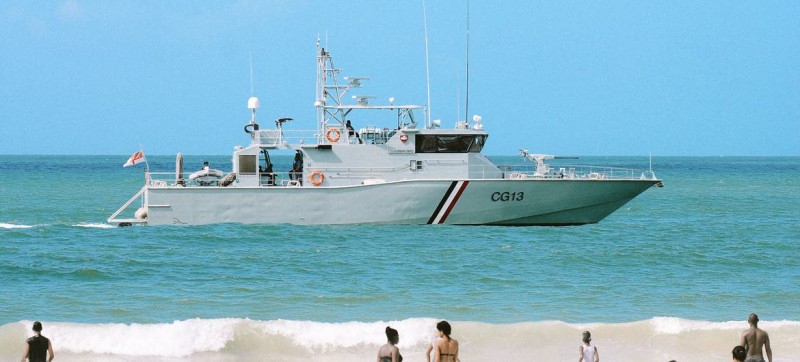A boat of the Trinidad and Tobago Coast Guard passes in Maracas Bay, Trinidad and Tobago. Following the death of a baby during an interception at sea off the southeast coast of the island of Trinidad on Sunday, UN agencies have expressed their deep sadness and called for stronger measures to protects refugees and migrants. The vessel carrying Venezuelans was intercepted by the Trinidad and Tobago Coast Guard when it entered its maritime territory. According to the Coast Guard, a mother and her infant were injured during the incident. The woman was taken to a health facility, but the baby tragically died. UN refugee agency UNHCR, the UN human rights office (OHCHR), the International Organization for Migration (IOM) and the UN Children’s Fund (UNICEF) issued a joint plea for the loss to spur countries to do more to prevent similar deaths from occurring.
UNHCR, IOM, OHCHR and UNICEF deeply saddened at Venezuelan baby’s death during interception at sea off Trinidad Tobago: https://t.co/iv7a3daqiv pic.twitter.com/Q2XUQNR2hd
— IOM Caribbean (@IOM_Caribbean) February 7, 2022
“We are deeply saddened by this tragedy and convey our heartfelt condolences to the family and loved ones who are grieving this loss and a speedy recovery to the injured”, the agencies said.
“Nobody should have to lose their life in their search for safety, protection and new opportunities,” said Dr Eduardo Stein, Joint Special Representative of UNHCR and IOM for Venezuelan refugees and migrants.
Dangerous journeys
“This incident highlights the plight faced by people on the move during desperate and dangerous journeys to safety”, Dr Stein added.
According to the UN agencies, in the absence of sufficient safe pathways, many Venezuelan refugees and migrants are forced to resort to risky sea and land crossings. These have become even more complex as travel and health restrictions limit formal paths for resettlement.
“Pathways for entry and stay should be consistent with international human rights law and humanitarian considerations ,and include access to due process and procedural safeguards”, the joint statement continues.
‘Tragedies are all too common’
In their call, the agencies reminded that “State parties to the Convention on the Rights of the Child, must safeguard the rights of all children on their territory, irrespective of their nationality or status”.
Reminding that parents are oftentimes seeking a safer and brighter future for their children, the agencies noted that “tragedies are all too common”.
UNICEF Regional Director for Latin America and the Caribbean, Jean Gough, reiterated that “no migrant child should ever die, whether traveling with their parents or alone. No mother wants to put the lives of her children at risk on a small ship in the deep sea, unless she has no other option”.
According to recent data, two in three Venezuelans now on the move, are women and children.
“This tragic event is a stark reminder that they are the most vulnerable among the vulnerable. They deserve special attention, protection and safety – anywhere and anytime”, Mr. Gough added.
Protection rights
UNHCR, IOM, OHCHR and UNICEF are appealing to States to establish mechanisms that will help protect the rights of people on the move – particularly women, girls, boys, and others with specific protection needs – including the right to have access to proper regularization and asylum procedures.
“To prevent these tragedies from happening again, safer pathways for refugees and migrants are needed” Dr Stein said.
UNHCR, IOM, OHCHR and UNICEF offered their heartfelt condolences to all the family and loved ones grieving this loss. Humanitarian assistance and support are being offered to help them during this time.
Last December, UNHCR and IOM launched a joint appeal for $1.79 billion, to fund a regional plan to support the increasing needs of the refugees and migrants from Venezuela, and their host communities across 17 countries in Latin America and the Caribbean.




Comments are closed.